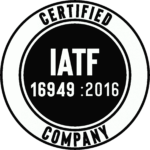Mechanical Property Test
At SIMIC Manufacturing, we prioritize the mechanical properties of materials to ensure their performance in real-world applications. Mechanical property testing is an essential process in determining how materials will behave under various forces, stresses, and environmental conditions. Whether you’re working with cast iron, ductile iron, or steel, our comprehensive testing services provide valuable insights into the material’s strength, durability, and overall suitability for your specific requirements.

What is Mechanical Property Testing?
Mechanical property testing involves measuring the fundamental properties of materials that determine how they will perform under load, pressure, or stress. These properties are critical for assessing the material’s capability to withstand the demands of different applications. Key mechanical properties include:
- Tensile Strength: The maximum stress a material can withstand before breaking.
- Yield Strength: The stress at which a material begins to deform plastically.
- Elongation: The ability of a material to stretch or elongate under stress.
- Hardness: The resistance of a material to indentation or scratching.
- Impact Toughness: The material’s ability to absorb energy during a sudden impact without fracturing.
- Fatigue Strength: The ability of a material to withstand repeated loading without failing.
Why is Mechanical Property Testing Important?
Mechanical property testing is crucial for several reasons:
- Quality Control: Ensures that the material meets the required specifications for strength and durability.
- Material Selection: Helps in selecting the most suitable material for specific applications based on mechanical properties.
- Failure Prediction: Identifies potential weaknesses in the material, reducing the risk of product failure under operational stresses.
- Compliance: Verifies that the material complies with industry standards and regulations, ensuring safety and reliability.
Our Mechanical Property Testing Process
At SIMIC Manufacturing, we utilize state-of-the-art equipment and methods to perform a wide range of mechanical property tests. Our testing process ensures that each material meets industry standards and is optimized for performance. Below are the main stages of our mechanical property testing process:
1. Tensile Testing
Tensile testing is used to measure the material’s response to a pulling or stretching force. The test provides essential data on tensile strength, yield strength, and elongation, helping us determine how much stress the material can endure before it begins to deform or fracture.
- Test Method: Samples are pulled in a universal testing machine (UTM) until they break. The force and elongation are measured.
- Applications: Ideal for assessing metals, alloys, and polymers used in structural components, automotive parts, and machinery.
2. Hardness Testing
Hardness testing measures the material’s resistance to indentation or scratching, providing an indication of the material’s strength and wear resistance. We use various hardness scales such as Rockwell, Brinell, and Vickers to evaluate materials.
- Test Method: A hard indenter is pressed into the material under a specified force, and the size or depth of the indentation is measured.
- Applications: Used in assessing materials subjected to wear, abrasion, and other surface stresses.
3. Impact Testing
Impact testing evaluates the material’s ability to absorb energy during a sudden impact or shock loading. This test is crucial for materials used in safety-critical applications, such as automotive and aerospace components.
- Test Method: The material is struck by a hammer or pendulum in a Charpy or Izod impact test, and the amount of energy absorbed before fracture is measured.
- Applications: Common for materials used in high-impact environments, including automotive parts, machinery, and heavy equipment.
4. Fatigue Testing
Fatigue testing measures the material’s resistance to repeated loading cycles, helping predict the material’s lifespan under fluctuating stresses. This is vital for components that will undergo repeated stress over time.
- Test Method: A sample is subjected to cyclic loading until it fractures, and the number of cycles to failure is recorded.
- Applications: Common in testing materials used in automotive engines, aircraft components, and industrial machinery.
5. Compression Testing
Compression testing measures the material’s behavior under compressive stress, such as the force that can cause a material to deform or fail under pressure.
- Test Method: A sample is compressed between two plates, and the deformation is measured to determine the material’s compressive strength and modulus.
- Applications: Important for testing materials used in construction, building materials, and other compressive-loaded structures.
Mechanical Property Testing for Cast Irons and Alloys
Our mechanical property testing services are tailored to the unique needs of various materials, including gray iron, ductile iron, and steel alloys. Each material is tested to ensure that it meets the performance criteria required for its intended application.
- Gray Iron: Tests focus on tensile strength, hardness, and impact resistance, with a specific focus on flake graphite’s influence on material behavior.
- Ductile Iron: With its nodular graphite structure, ductile iron is tested for tensile strength, impact toughness, elongation, and fatigue resistance, ensuring that it meets the high-performance requirements of automotive and heavy-duty applications.
- Steel Alloys: Steel materials are tested for strength, ductility, and fatigue resistance, focusing on how different alloy compositions and heat treatments affect their mechanical properties.
Standard Compliance
Our mechanical property testing services adhere to international standards such as:
- GB/T 1348-2009 (for Ductile Iron)
- GB/T 9439-2008 (for Gray Iron)
- ASTM A536 (for Ductile Iron, USA)
- EN 1563 (for Cast Irons, Europe)
- ISO 6892 (for Tensile Testing)
- ISO 6506 (for Hardness Testing)
These standards ensure that our materials meet the highest levels of performance and reliability, and that they comply with the strictest industry regulations.
Data Documentation and Traceability
In line with our quality management system, we maintain comprehensive records of all mechanical property test results. Our detailed reports include:
- Test data (strength, elongation, hardness, impact toughness, etc.)
- Compliance with relevant standards
- Digital images of test results (fracture surfaces, material behavior)
Each test is documented and securely stored for traceability, ensuring that we can provide full transparency and data reliability for future reference.
Contact SIMIC Manufacturing
Mechanical property testing is a fundamental aspect of material selection and product performance. At SIMIC Manufacturing, we provide comprehensive testing services to ensure that our materials meet the rigorous demands of your applications. By using advanced testing methods and adhering to global standards, we guarantee that our products—whether made from gray iron, ductile iron, or steel alloys—will perform optimally in real-world conditions.
Contact SIMIC Manufacturing today to learn more about how our mechanical property testing services can ensure the performance and reliability of your materials.



